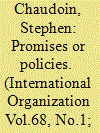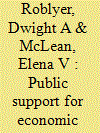|
|
|
Sort Order |
|
|
|
Items / Page
|
|
|
|
|
|
|
| Srl | Item |
| 1 |
ID:
165402


|
|
|
|
|
| Summary/Abstract |
We experimentally investigate the informational theory of legislative committees (Gilligan and Krehbiel 1989). Two committee members provide policy-relevant information to a legislature under alternative legislative rules. Under the open rule, the legislature is free to make any decision; under the closed rule, the legislature chooses between a member’s proposal and a status quo. We find that even in the presence of biases, the committee members improve the legislature’s decision by providing useful information. We obtain evidence for two additional predictions: the outlier principle, according to which more extreme biases reduce the extent of information transmission; and the distributional principle, according to which the open rule is more distributionally efficient than the closed rule. When biases are less extreme, we find that the distributional principle dominates the restrictive-rule principle, according to which the closed rule is more informationally efficient. Overall, our findings provide experimental support for Gilligan and Krehbiel’s informational theory.
|
|
|
|
|
|
|
|
|
|
|
|
|
|
|
|
| 2 |
ID:
083749


|
|
|
|
|
| Publication |
2008.
|
| Summary/Abstract |
The poliheuristic (PH) theory of decision making has made important contributions to our understanding of political decision making but remains silent about certain key aspects of the decision process. Specifically, PH theory contends that leaders screen out politically unacceptable options, but it provides no guidance on (1) the crucial threshold at which leaders reject options as politically unacceptable, (2) whether this threshold varies across leaders and situations, and, (3) if so, which factors shape variation in this threshold. We integrate PH theory with research on political leadership and decision context and derive hypotheses from this modified PH framework. An experimental test reveals that situational context and leadership style affect both (1) the ``noncompensatory threshold'' at which decision makers reject options as politically unacceptable and (2) how much decision makers rely on their constituents' views in making policy choices. We conclude that a modified PH theory incorporating these insights will have enhanced explanatory and predictive power.
|
|
|
|
|
|
|
|
|
|
|
|
|
|
|
|
| 3 |
ID:
131491


|
|
|
|
|
| Publication |
2014.
|
| Summary/Abstract |
A key assumption of audience costs theories of crisis bargaining and international cooperation is that audience members have strong preferences for consistency between their leader's commitments and actual policy choices. However, audiences also have strong preferences over the policy choices themselves, regardless of their consistency with past commitments. I conducted a randomized survey experiment to evaluate the magnitude of consistency and policy effects in the context of international agreements over trade policy. Respondents with expressed policy preferences, whether supporting or opposing free trade, have muted reactions to learning that their leader has broken an agreement. Only respondents with no opinion on trade policy are affected by learning that their leader's policy is inconsistent with prior commitments. This suggests that constituents' underlying preferences limit the degree to which audience costs influence policymakers' calculations
|
|
|
|
|
|
|
|
|
|
|
|
|
|
|
|
| 4 |
ID:
152898


|
|
|
|
|
| Summary/Abstract |
What are the determinants of public support for the government’s foreign policy? We shed light on this question using experiments investigating public support for economic sanctions. Our results suggest that humanitarian concerns are associated with individuals’ decisions to support the use of sanctions against a target country. We find that high levels of public pain in the target country have a negative relationship with the likelihood of supporting sanctions, and tailored sanctions, which aim to shift damage from the targeted country’s population to its leadership, have a higher probability of support than comprehensive sanctions. At the same time, policy effectiveness shapes public support, but only indirectly—through individuals’ subjective evaluations rather than given estimates of policy success. When subjective evaluations of effectiveness are higher, sanctions receive more public support. Recalled effectiveness, on the other hand, has no direct effect on the decision to support the sanction policy.
|
|
|
|
|
|
|
|
|
|
|
|
|
|
|
|
|
|
|
|
|